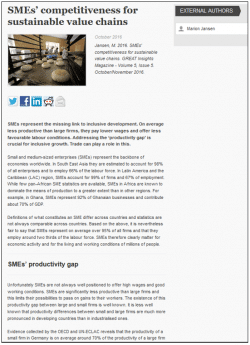
Policy highlights:
- In developing countries small and medium-sized enterprises (SMEs) represent over 95% of all firms and employ two thirds of the labour force. Yet, SMEs are generally less productive than large firms, are often unable to offer high wages and good working conditions and employ a large share of the vulnerable sections of the workforce (i.e. less experienced, less educated and poorer workers).
- Given that SMEs generally employ those people targeted by the Sustainable Development Goals, increased productivity in this sector would contribute to meeting these goals as it would lead to higher wages in the low-wage segment of the economy, with positive distributional effects.
- To achieve these effects policymakers are advised to: 1) promote international activities by local SMEs, because internationally-active SMEs generate more and better jobs; 2) provide SMEs with better access to modern information and communication technologies, because weak connectivity creates a serious competitiveness gap between small and large companies; and 3) introduce policies that help SMEs to overcome the obstacles that prevent them from linking to international value chains.










